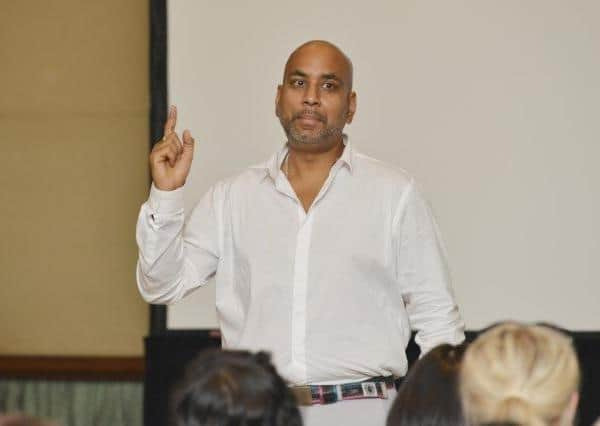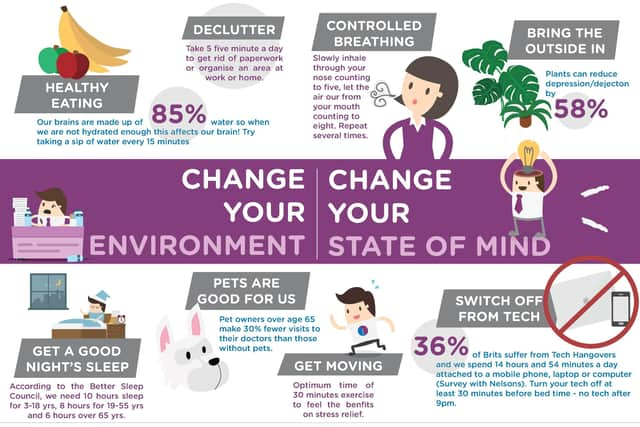The true cost of stress?


The 2018/19 Labour Force Survey also revealed 602,000 workers suffered from the conditions and an average of 21.2 days were lost per case.
The numbers were published by the Health and Safety Executive as part of its “Work-related stress, anxiety or depression statistics in Great Britain 2019”.
Advertisement
Hide AdAdvertisement
Hide AdBut the findings didn’t come as any surprise to Stress Management Society founder Neil Shah who thinks the problem may be bigger due to people feeling uncomfortable about admitting to suffering from stress.


He said: “Personally, I think those figures may be under reported. Often stress doesn’t come up directly, it comes up indirectly. A lot of people still don’t want to report it. There is still a fair amount of stigma associated with the subject. It may come up as colds, flu, muscular skeletal issues because a lot of people don’t want to hold their hand up and say they are off due to stress or mental health.”
Mr Shah (right) set up the Stress Management Society in 2003 after suffering from the condition himself and wanting to help others. He was running a multi-million pound IT recruitment business and was in his twenties when things started to turn sour.
The former young entrepreneur of the year said: “I was on this sky rocket to success but it was too much too young, too quick and it kind of went to my head.”
Advertisement
Hide AdAdvertisement
Hide AdHe added: About five years after starting the business I ended up losing everything: car gone, business gone, all the money gone. Most of the people I thought were my closest friends turned their backs on me. Everything that could have gone wrong went wrong in a very short period of time, over three or four-month period.”


It culminated in him attempting to take his own life. But he was determined to get back up and to inspire others.
He shared the story of his darkest day to illustrate what he does think are shocking figures, that 84 men take their own life every week in the UK.
Mr Shah said: “In 2019 the main cause of death in a man under the age of 45 in Britain and Western Europe is suicide. The second main cause of death in 15 to 29-year-olds on Planet Earth today is suicide. It is one of the biggest killers of young people. But it is also the dirty little secret we don’t talk about.”
Advertisement
Hide AdAdvertisement
Hide AdHe believes we are failing “the most vulnerable members of our society, particularly men who grow up in a world where they are told to ‘man up, soldier on, and to pull yourself together and get on with it’.”


Over the last 16 years The Stress Management Society, a non-profit organisation, has been helping individuals and companies recognise and reduce stress. Its runs workshops, publishes guides and delivers updates. Its clients include Shell and British Airways.
The company has been heavily involved in International Stress Awareness Week (November 4 to 8), whose theme was “building resilience”. Mr Shah has been using the analogy of imagining a bridge buckling under pressure to illustrate the topic.
He talks about the two choices of preventing the bridge from collapsing, either to take the pressure off or to increase the resources. He believes human beings are exactly the same and believes they need coping strategies to help them take the strain.
Advertisement
Hide AdAdvertisement
Hide AdMr Shah said: “How do you upgrade your operating system to cope with the pressures of modern life? That could incorporate any number of different techniques that are going to help your bridge to be stronger. It could be nutritional changes, lifestyle changes, like taking up exercise, walking, movement, hydration, meditation and mindfulness. There are so many things you can do, like having a support network.
He has been asking people in workshops how they are going to take the pressure off “their bridge” or how they are going to strengthen it. He believes the pressure is only going to increase and they need to become more resilient now and in the future,
He says the solutions are often very simple but adds: “The challenge is we don’t recognise there is a problem until it is already too late because we are so busy that we don’t stop pay attention to basic biological needs. Most people don’t register when they are tired, hungry, thirsty, need the bathroom because you are so focussed on that email, that report and getting that thing done.”
He said the first step was ‘recognition’ and the second was to give the body what it needs to thrive.
Advertisement
Hide AdAdvertisement
Hide AdThe “chief de-stressing officer,” as Mr Shah likes to be known, is advising people to develop an action plan or a lifestyle code of conduct, where you have time to switch off from the 24/7 gadget culture.
Mr Shah said: “Ultimately the pace of life for most people is not sustainable and we don’t pay attention until we get ill, keel over or have a heart attack or something more serious.”
He wants people to embrace the “It’s OK to be not be OK” concept and to be more open about their feelings, especially men who often “reserve their emotions for the stands of football or rugby stadium”.
Mr Shah believes people are getting better about talking about mental health, adding: “We are seeing more stuff in the press. We are seeing well known personalities from Prince William to Prince Harry, to footballer players to Gareth Southgate, to all kinds of people up and down society that are getting more comfortable openly talking about mental health and the impact it has on society.”
For more information see www.wellbeing.work.